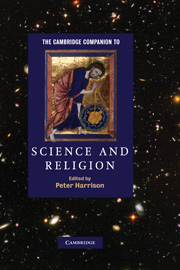Book contents
- Frontmatter
- Introduction
- Part I Historical interactions
- Part II Religion and contemporary science
- Part III Philosophical perspectives
- 11 Atheism, naturalism and science: three in one?
- 12 Divine action, emergence and scientific explanation
- 13 Science, God and cosmic purpose
- 14 Ways of relating science and religion
- A guide to further reading
- Index
11 - Atheism, naturalism and science: three in one?
from Part III - Philosophical perspectives
Published online by Cambridge University Press: 28 July 2010
- Frontmatter
- Introduction
- Part I Historical interactions
- Part II Religion and contemporary science
- Part III Philosophical perspectives
- 11 Atheism, naturalism and science: three in one?
- 12 Divine action, emergence and scientific explanation
- 13 Science, God and cosmic purpose
- 14 Ways of relating science and religion
- A guide to further reading
- Index
Summary
“The more the universe seems comprehensible, the more it also seems pointless.” (Steven Weinberg, Nobel laureate in physics) / The past few years have seen a spate of books arguing that God does not exist and that religion is one of the most pernicious and dangerous aspects of modern culture. As it happens, the arguments of the new atheists are all over the place, ranging from criticisms of the traditional proofs of the existence of God to moral exhortations not to follow the prescriptions of the religious. However, the authors all presume to write in the name of science and certainly it is in that sense that most readers, receptive and antagonistic, have taken them. This chapter is offered as a reflection of the interest that these writers have obviously sparked. In the light of today's science, what can be said about the intellectual status of religion and the central claims that are made in its name? Defining and constraining the discussion, I shall focus on Western religion and of that primarily on Christianity. This is not unfair or mere chauvinism. Modern science emerged in a Christian context and much of the discussion today is framed explicitly in terms of Christianity. Where appropriate, the discussion can easily be extended. I shall consider science to range from the physical sciences through the biological sciences and on to the social sciences, and I shall understand it as an attempt to understand the world of experience in terms of causes, things which presuppose the universal rule of natural law. I take it therefore that modern science is rooted in naturalism.
- Type
- Chapter
- Information
- The Cambridge Companion to Science and Religion , pp. 229 - 243Publisher: Cambridge University PressPrint publication year: 2010
- 3
- Cited by

